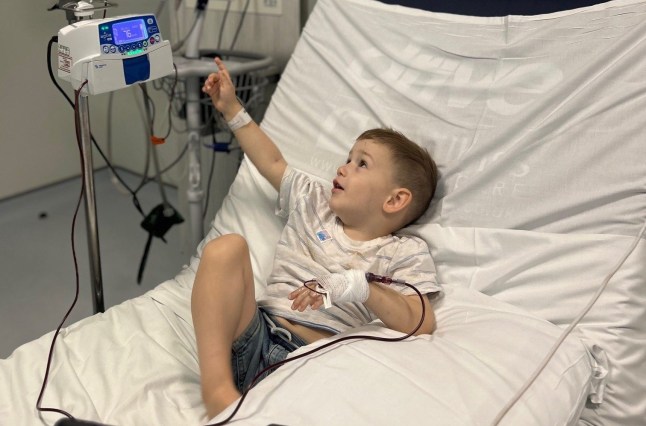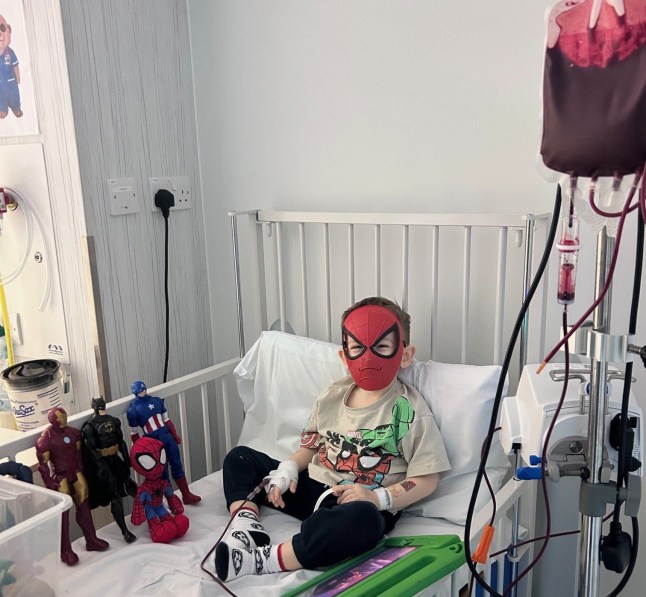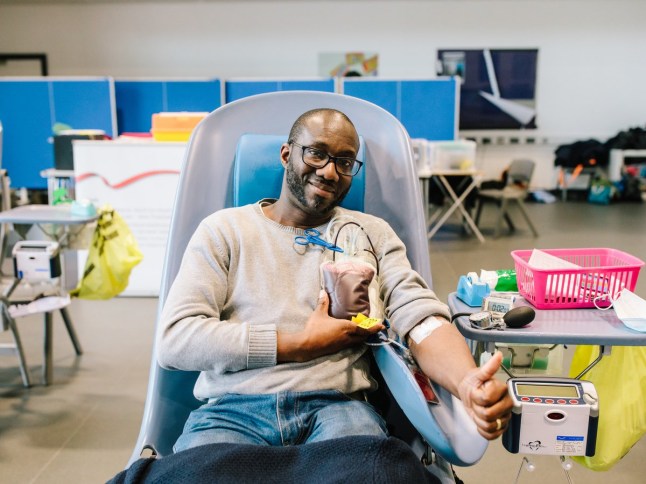
The NHS needs one million people to regularly donate blood to meet demand, they said in a major new recruitment drive.
Low stocks prompted officials to issue an ‘amber alert’ over supply for hospitals last year – and stocks have remained low ever since, officials said.
The situation over the last year has been ‘challenging’, with authorities highlighting that just under 800,000 people donated last year, which is around 2% of the eligible adult population.
This means an annual shortfall of over 200,000 donors to meet growing demand for more than 5,000 donations every day, as well as more to replace those who can no longer donate due to old age or medical conditions.
NHS Blood and Transplant (NHSBT) called on people to sign up as donors, saying more must be done to avoid a ‘red alert’, which means that blood supply is so low that there is a threat to public safety.
The group which oversees blood stocks said there has been a rise in the number of people who registered to be donors in the last year, but only 24% of these have actually gone on to donate.

At the moment in the UK, men can give blood at maximum every 12 weeks (four times a year), and women every 16 weeks (three times a year), due to differing iron levels, although there are some calls to reduce these intervals.
Supplies are needed for emergencies, such as if someone loses a lot of blood in a trauma situation, but also for surgeries, including cancer operations and transplants, which require blood. Patients with conditions like sickle cell disease, thalassemia, or leukemia also often need regular transfusions.
The last amber alert was triggered in July 2024 after a cyber attack on London hospitals.
Where can I dontate blood?
There are 25 permanent NHS donation centres in major towns and cities. These centres are often open at evenings and weekends and have more appointments available than sessions in other venues.
Permanent donor centres are highlighted when you search for an appointment online or using the NHS Give Blood app.
There are also mobile donation sessions from church halls and other community venues.
The NHS appointment system
balances the supply of blood with the changing demand from patients.
You can book an appointment to give blood as soon as you sign up as a blood donor. However, the next convenient appointment might not be straightaway.
This could be because the NHS already has a good supply of your blood type.
People need blood all year round, so all donations will still save lives, even if your appointment is in a few months’ time.
Things that affect when you’ll get an appointment
There are 8 main blood types but hospitals need different amounts of each type.
Blood also has a limited shelf life so we avoid waste by only collecting the amount we need
To make sure we collect the right amount of each type, there are different numbers of appointments for different blood donors.
Things that affect when you’ll get an appointment include:
Your blood type
There are more appointments for donors with blood types that people often need, such as O negative.
On the other hand, there are fewer appointments for blood types where demand is lower, such as AB positive.
Changes in blood stock levels
We aim to have a 6-day supply of each blood type in stock.
If supplies of a particular blood type dip, we prioritise appointments for regular donors with that blood type.
Source: NHS Give Blood (https://www.blood.co.uk/news-and-campaigns/campaigns/blood-donor-appeal/)
It said there is a ‘critical’ need for more donors who have the so-called universal blood type – O negative blood – which is needed for treatment in emergencies, when blood type may not be known immediately.
There is also a need for more black donors, who are more likely to have specific blood types which can help treat people with sickle cell disease.
NHSBT chief executive Dr Jo Farrar said: ‘There are many thousands of people who donate regularly and help us keep patients alive. Thank you. You are amazing. You keep the NHS going and save and transform thousands of lives a year.
‘Our stocks over the past 12 months have been challenging. If we had a million regular donors, this would help keep our stocks healthy – you’d truly be one in a million.
‘Please book an appointment today, experience how good it feels to save lives, and come and do it again in a few months.’

One family is backing the campaign for more donors due to their own experience receiving regular blood transfusions.
Four-year-old Isaac Balmer, from Hull, was born with hereditary spherocytosis – a genetic blood condition which causes red blood cells to break down faster than normal, leading to severe anaemia and other complications.
He receives blood transfusions every 12 weeks.
His mother Jasmin Suggit, a newborn hearing scanner at the hospital where Isaac receives his treatment, said: ‘It’s been a rollercoaster; Isaac’s haemoglobin levels fluctuate, and when they drop significantly, he becomes lethargic and jaundiced.
‘But when he receives his transfusion, you see the colour return to his cheeks, and his energy levels soar before our eyes. It is incredible.
‘During his transfusions, he refers to donor blood as “Hulk blood” and imagines himself becoming stronger and healthier, but this wouldn’t be possible without the real life, everyday superheroes who keep Isaac and others like him alive, thanks to their regular blood donations.’
Health Minister Baroness Merron said the government was working to make donating blood easier by opening up new donor centres and making appointments available closer to home.
Get in touch with our news team by emailing us at webnews@metro.co.uk.
For more stories like this, check our news page.
MORE: Nurse struck off after sharing Covid-19 conspiracy theories online
MORE: I didn’t realise my food addiction was a symptom of ADHD
MORE: Urgent recall of 1,700,000 air conditioners over fears they harbour mold









